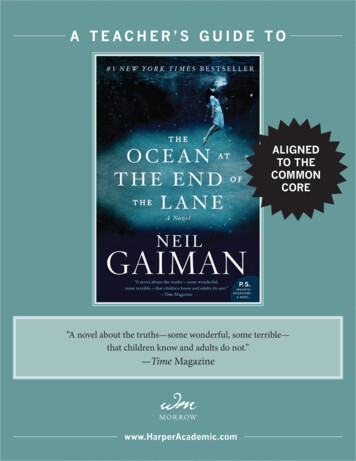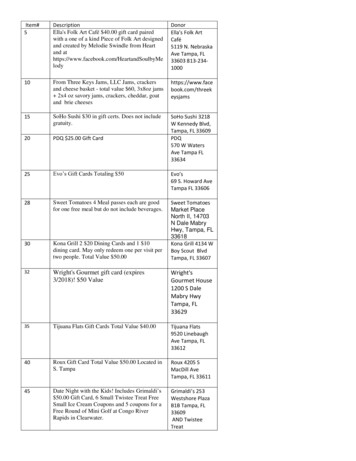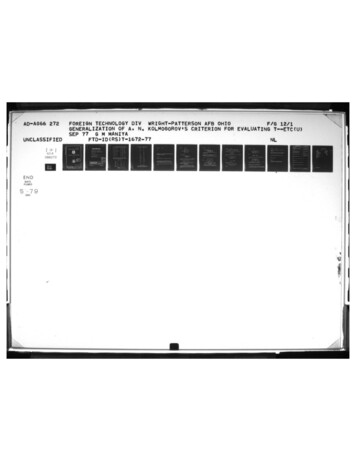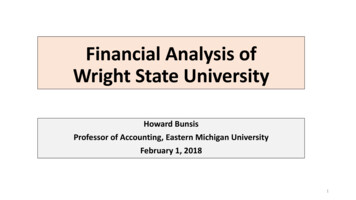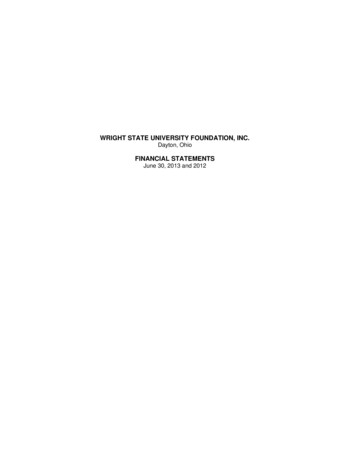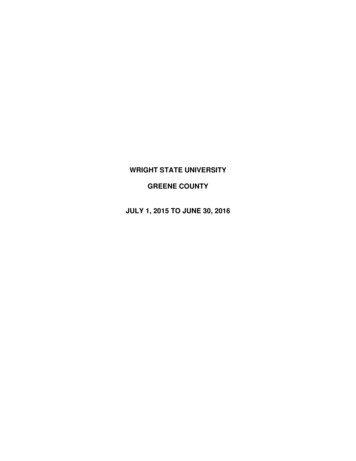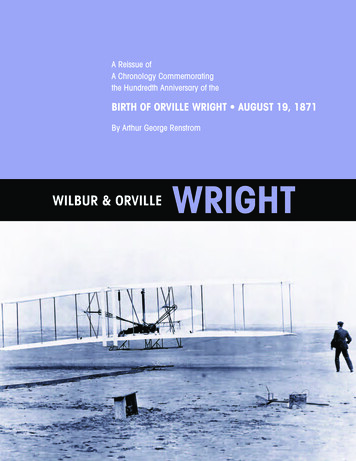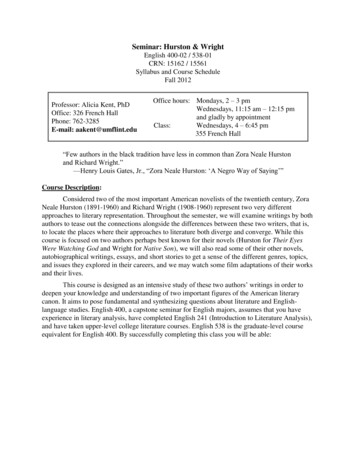
Transcription
Seminar: Hurston & WrightEnglish 400-02 / 538-01CRN: 15162 / 15561Syllabus and Course ScheduleFall 2012Professor: Alicia Kent, PhDOffice: 326 French HallPhone: 762-3285E-mail: aakent@umflint.eduOffice hours: Mondays, 2 – 3 pmWednesdays, 11:15 am – 12:15 pmand gladly by appointmentClass:Wednesdays, 4 – 6:45 pm355 French Hall“Few authors in the black tradition have less in common than Zora Neale Hurstonand Richard Wright.”—Henry Louis Gates, Jr., “Zora Neale Hurston: ‘A Negro Way of Saying’”Course Description:Considered two of the most important American novelists of the twentieth century, ZoraNeale Hurston (1891-1960) and Richard Wright (1908-1960) represent two very differentapproaches to literary representation. Throughout the semester, we will examine writings by bothauthors to tease out the connections alongside the differences between these two writers, that is,to locate the places where their approaches to literature both diverge and converge. While thiscourse is focused on two authors perhaps best known for their novels (Hurston for Their EyesWere Watching God and Wright for Native Son), we will also read some of their other novels,autobiographical writings, essays, and short stories to get a sense of the different genres, topics,and issues they explored in their careers, and we may watch some film adaptations of their worksand their lives.This course is designed as an intensive study of these two authors’ writings in order todeepen your knowledge and understanding of two important figures of the American literarycanon. It aims to pose fundamental and synthesizing questions about literature and Englishlanguage studies. English 400, a capstone seminar for English majors, assumes that you haveexperience in literary analysis, have completed English 241 (Introduction to Literature Analysis),and have taken upper-level college literature courses. English 538 is the graduate-level courseequivalent for English 400. By successfully completing this class you will be able:
ENG 400/538: Hurston & WrightAlicia KentLearning Objectivesto further develop your critical reading, writing, speaking, listeningand group interaction skills (critical thinking);to develop historically-specific and culturally-informed approachesto literary texts by Hurston & Wright (methodology);to interrogate a variety of literary genres and compare theirexpectations (content knowledge);to demonstrate facility with research methods and literary databasesused in literary studies (information literacy);to locate relevant, appropriate secondary sources (literary criticismand socio-historical sources), evaluate their usefulness and validity,and integrate them accurately and effectively into your writing withconsistent and ethical citation of source material (informationliteracy);to consider different scholarly views of a particular text andexamine the assumptions of each view (critical thinking);to formulate your own research project and then engage in closereading and/or careful engagement with primary texts and includerelevant and appropriate scholarship to formulate a sound projec;to position your argument within the academic conversationsurrounding Hurston & Wright (information literacy);to present your own sophisticated ideas clearly and effectively inwritten and oral presentations that demonstrate familiarity withrhetorical strategies of literary studies and knowledge of relevantliterary criticism (writing skills, critical thinking);to reflect on your own values and habits as reader, writer, andspeaker, to formulate your own questions, to materialize directionsfor future individual inquiry in your academic discipline, and tointerpret your own educational process and experiences (reflection);to apply knowledge to complex issues in increasingly broad spheresand consider how literature may be cultural products that reflect,reinforce, or resist dominant discourses and how they may beproducts of complex systems of historical contingencies, and race,gender, and sexual politics (synthesis and application).2Course Tools toAssess Goals participation lead discussion article analyses career presentation seminar project presentation participation seminar project participation article analysesseminar projectcareer presentationarticle analysesseminar project article analysesseminar projectproposalarticle analysesseminar projectpresentationarticle analysesproposalseminar projectpresentationcareer presentationseminar projectpresentation lead discussioncareer presentationproposalseminar projectparticipationproposalcareer presentationseminar project
ENG 400/538: Hurston & WrightAlicia KentRequired Course Texts:Richard WrightBlack Boy (American Hunger)Harper; ISBN: 978-0060929787Uncle Tom’s ChildrenHarper; ISBN: 978-0061450204Zora Neale HurstonDust Tracks on a RoadHarper; ISBN: 978-0060854089Jonah’s Gourd VineHarper; ISBN: 978-0061350191Native SonHarperPerennial; ISBN: 0060812494; 9780060812492A Father’s LawHarper; ISBN: 978-0061349164Their Eyes Were Watching GodHarper; ISBN: 978-0060838676 The Complete StoriesHarper; ISBN-13: 978-0060921712These texts are available at the UM-Flint Bookstore. You may also purchase them at abookstore of your choice. The ISBN number listed for each text will help you find the editionused in this course.All books are also available on reserve at the UM-Flint Thompson Library for 4-hourcheckout (although some are different editions).Additional Readings on Syllabus: In addition to the above novels, some shorter course readingsare available only in Blackboard. These readings are denoted with “BB” in the syllabus. To access Blackboard, go to https://bb.umflint.edu. You will need a UM-Flint usernameand password to access our course shell. Readings are listed in the order we will read them in the “Readings” folder. Please print the readings and bring them to class on the assigned date.Handouts: Handouts from class will be available online in Blackboard in “Handouts.”Course Requirements: You must complete all of these requirements to receive a passing gradein this course. If you do not complete one of these requirements (such as failure to hand in anassignment or failure to meet the attendance requirements), you cannot pass the course. For yourown protection, you should keep a copy of everything you turn in to me. Attendance. Your attendance is required. If you accumulate more than one absences, your participation grade will be lowered 25points for every subsequent absence. If you accumulate four absences, you will fail the course (except in cases where you and Imake alternative arrangements because of extenuating circumstances). I do not make distinctions between excused or unexcused absences—all absencescount.3
ENG 400/538: Hurston & WrightAlicia Kent Please let me know during the first two weeks of classes if you must miss a class forreligious observance, important scheduled events that conflict with class, or otherunavoidable reasons for missing class. If you miss class, please email me for announcements. Also please get notes from othersin the class and handouts from Blackboard. Out of respect for your classmates, please come to class on time. If tardiness to class(more than 10 minutes) becomes a persistent problem, I will count lateness as absences. I generally make all announcements at the start of class, so if you arrive late, be sure toget the announcements from me after class. Participation. This class emphasizes discussion and interaction with course issues and othersin the course. It also includes a significant amount of reading. You are expected to come toclass prepared, having read all the readings assigned for that day, and participate fully andconstructively in the in-class discussion, having something to say in nearly every classsession. You must bring the day’s reading assignments to class and be prepared to discuss it.Your participation in class discussions as well as reading course material out loud in classwill be counted as participation. In-class writing and informal presentations of your workmight also be a part of participation.Online Discussion. Online discussion is another venue for participation; contributions onthe Discussion Board in Blackboard can raise your grade. Please check our courseBlackboard companion on a regular basis. Lead Discussion. Once during the semester, you will be responsible for leading the classdiscussion for a portion of the class period. You do not need to do outside research for thistask; instead, this is your chance to explore a topic in the reading that interests you (ratherthan discussing something that I’ve chosen). You will post discussion questions inBlackboard prior to the discussion. Early in the semester, I will hand out a sign up sheet toallow you to choose your top choices for discussion leading dates. Article Analysis Papers (2 for ENG 400; 3 for ENG 538): These 3-4 page papers criticallyanalyze an article of literary criticism published in an academic journal or book. Youranalysis should include a summary of the article’s key points, your assessment of its strengthsand weaknesses, and your analysis of its contribution to literary studies. You will use thelibrary’s online databases to locate these articles. Career Presentation and Handout: Research a career that English majors might pursue. Thencreate a handout and present information to the class about what this career entails, whatskills and abilities the career emphasizes, what kinds of people are in this field, howcompetitive the field is, how students might prepare for this job. Seminar Project: For this project you will examine a theme or element from one (or more) ofthe literary texts by Hurston or Wright and connect it to issues in your life and the worldtoday. This project is intended to go beyond what we have covered in class. It is not intendedto be an exhaustive research project, but you will be expected to do research and includerelevant literary criticism about the author, text, and time period to enhance your project.4
ENG 400/538: Hurston & WrightAlicia KentThe possibilities for the seminar project are up to you and as endless as your creativity. Iencourage you to choose a topic and design a project that fits your interests, field of study,educational goals, career plans, etc. Please feel free you to meet with me early in the semesterto brainstorm ideas and help you define a feasible and enjoyable (yes, this is possible!)seminar project. Possibilities might include (but are not limited to): Short story (or stories); Series of poems related to themes in one (or more) of the course texts; Chapter of a novel or prospectus/outline of a novel for a publisher or literary agent; Classroom unit for high school students on one (or more) of the course texts;* Autobiographical essay (12-15 pages) that connects issues in your life to theme(s) in oneor more of the texts; Literary analysis essay (10-15 pages) that includes literary criticism surrounding the textof your choice; A service-learning project with a community organization related to themes in the course.Let me know early in the semester if this option interests you, and we can work withMona Munroe-Younis of University Outreach to set up a partnership with anorganization. If you choose a service-learning option, a letter of intent for this project isdue by email to me early in the semester.Reflection Essay for Seminar Project: In addition to completing the project itself, all projects(except an autobiographical or literary analysis essay) will include a 5-7 page reflection essaythat explains the goals of this project, why you chose this medium, how it is connected to thecourse, what research (e.g., literary and historical) you did to carry it out, and ultimately whatyou learned from doing this project. Be sure to include a Works Cited with this reflectionessay. Proposal: A written proposal outlining your seminar project will be due midway through thesemester. In this proposal, you will outline what your project and medium will be, whatquestions you intend to explore, why it is an interesting or important issue, how you willcarry out this project, and what type(s) of research you will need to do to learn about thistopic (that is, how you will answer these questions). Presentation: The last class meeting is reserved for presentations. You will present yourseminar project to the class in a brief, 5-minute presentation. You are not expected to usePowerPoint or other tools in your presentation. Instead, it is an opportunity to share yourproject with the class and to get feedback and ideas from others.Grading and Deadlines: All papers are due at the beginning of class on the due date and mustbe typed. I take deadlines very seriously. No extensions will be given, except in the rarest of circumstances. Late assignments will be docked by a half-grade for each day late. Late Seminar Projects will not be accepted.5
ENG 400/538: Hurston & WrightAlicia Kent No other assignments will be accepted after the last regular class meeting (April 12). In an emergency, you may email me an assignment as a Microsoft Word attachment. If I amunable to open your file, one-half grade will be deducted for each day until I can it.AssignmentPointsDue Date (due at start of class)Syllabus ResponseStatement of Intent (for thosedoing a service-learning project)ParticipationLead DiscussionArticle Analysis Papers(ENG 400: 2 at 75 points each)(ENG 538: 3 at 50 points each)Friday, September 7 by 11:55 pmemailed to me, aakent@umflint.eduWednesday, September 26emailed to me, aakent@umflint.eduIn class (Blackboard participation canincrease score)Sign up handed out in class.Questions due by Monday before your date.1. Wednesday, October 32. Wednesday, October 243. Wednesday, November 7 (ENG 538 only)20050150Career Presentation and Handout Wednesday, November 14100Seminar Project ProposalWednesday, October 31175Seminar Project PresentationWednesday, December 525S
E-mail: aakent@umflint.edu Office hours: Mondays, 2 – 3 pm Wednesdays, 11:15 am – 12:15 pm and gladly by appointment Class: Wednesdays, 4 – 6:45 pm 355 French Hall “Few authors in the black tradition have less in common than Zora Neale Hurston and Richard Wright.” —Henry Louis Gates, Jr., “Zora Neale Hurston: ‘A Negro Way of Saying’” Course Description: Considered two of .
